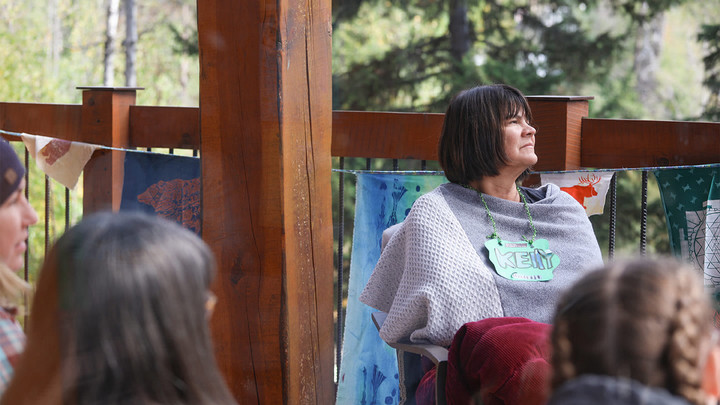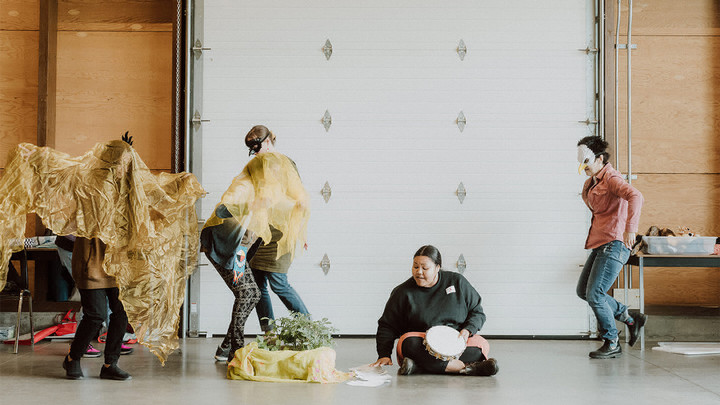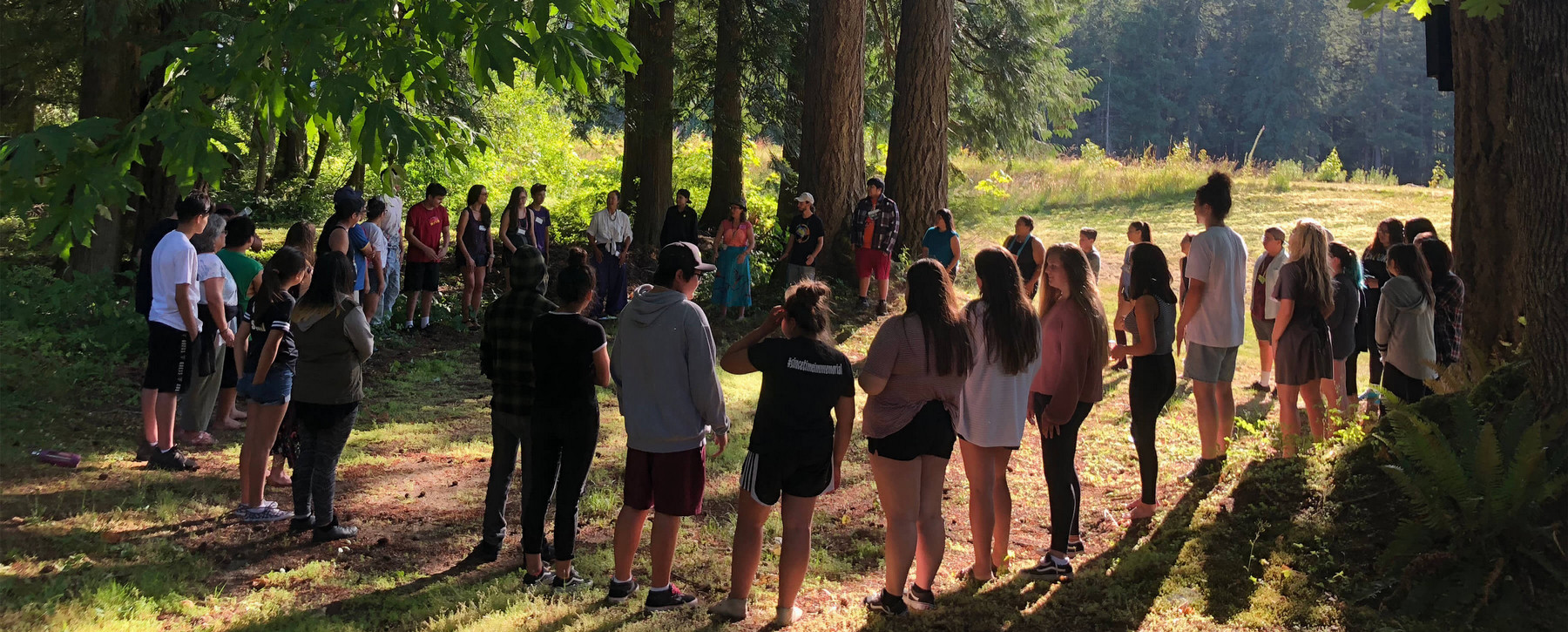Making change, together
December 04, 2024

Social Work alumna Kelly Terbasket helped create two organizations rooted in Indigenous beliefs to help challenge biases and fight the effects of colonization.
In her TEDx Talk, Kelly Terbasket invites you to draw a tree. Audience members sketch the first tree they imagine as Terbasket waits on stage at the 2022 event. “After you’ve drawn your tree, I’d like you to notice—do you have roots on your tree?” she asks.
A couple of people in the audience raise their hands, but most do not. Terbasket says this is a common occurrence. Then she goes deeper with the metaphor. “We don’t see the roots, so we don’t think about them,” she says. “Just like the roots, implicit bias runs deep but we don’t think about it. It’s invisible to us but it has so much power.”
So begins Terbasket’s TEDx Talk, “Recognizing our Implicit Bias Towards Indigenous Peoples.” Terbasket, a Bachelor of Social Work ’88 graduate who lives on her family’s ancestral homelands on the Blind Creek Indian Reserve in Syilx territory in the Similkameen Valley, has spent three decades exploring hidden misconceptions that fragment relationships and inhibit true community building. Her life’s work is dedicated to creating practices and tools that address systemic oppression and implicit bias.
Nuturing leaders
In 2013, Terbasket co-founded IndigenEYEZ, a non-profit organization that offers leadership and facilitation training rooted in Indigenous ways of being, focusing on instilling empathy, relationality and creativity in participants. Terbasket, who is program director, says IndigenEYEZ programs help to nurture current and emerging leaders who can work within their communities to face the impacts of colonization.
“My vision is that we have people with tools and confidence, courage and capacity,” she says. “We want to inspire people to feel like they can make change, because they can.”
IndigenEYEZ programs include Earth Sense, created to explore land-based connection and climate justice through an Indigenous lens, 13 Moons leadership development for Indigenous women and Two-Spirit Peoples and SPARK, a facilitation training program. Since its launch, IndigenEYEZ has held more than 200 workshops and 30 camps in Syilx-Okanagan territory and across the Lower Mainland.

Fighting implicit bias
As her TEDx Talk continues, Terbasket shares her own story of implicit bias. She shows the audience a photo of a young girl in a buckskin dress. While audience members guess that the child looks “proud” or “happy” in the photo, Terbasket, who shares that the photo is of her, remembers the experience differently.
She says she felt mad and ashamed. “Already, at such a young age, I had internalized the dominant narrative that to be Indigenous was to be inferior. The hard part was nobody saw I had internalized that.”
It’s a profound and painful moment in the TEDx Talk. Over time, Terbasket says she learned to question the internalized racism that had distorted her views of what it means to be Indigenous. “I learned about the incredible wisdom of Indigenous Peoples,” she says.
Time at UVic
Terbasket credits her time in UVic’s School of Social Work with starting her journey of healing. She joined UVic at a time when there was no First Peoples House, far fewer Indigenous students and far fewer supports available. The School of Social Work hadn’t yet developed the Indigenous specializations for which it is now known.
Terbasket says that, at first, she felt like she didn’t belong. She did, however, have a few classmates who were Indigenous and was able to form some friendships. A couple of years into her degree, Terbasket found out about UVic’s Native Students Union, which also helped her build a sense of community and belonging on campus.
In classes, she learned about residential schools, which her family never spoke about at home. Many of her community members and extended family had been forced to attend Kamloops Indian Residential School, where in 2021 the Tk̓emlúps te Secwépemc found what they believe to be 200 burial sites on the grounds, sparking a national movement to find the missing Indigenous children who never made it home from residential schools.
As Terbasket studied, she thought about the contrast between the experiences of her two great grandfathers, a German settler who spoke about his new homeland as the “land of milk and honey,” and her Similkameen grandfather, who fought to water a small fruit orchard while his basic rights were violently taken away.
She integrated the social-work program’s focus on community development into her own philosophy. Terbasket says she realized Indigenous communities have the right to heal and move forward. She decided to start with herself, undoing the negative narrative about her culture that the little girl in the buckskin dress had absorbed.
Terbasket completed practicums with the Victoria Native Friendship Centre, where she met Elder Alex Nelson, who became a mentor to her. She travelled to Alert Bay for another practicum, where she helped make a film about survivors of sexual abuse, and learned about how other Indigenous communities managed child welfare and kept communities together. She deepened her understanding of herself and her connections through culture and ceremony. “I went from shame to pride,” she says.
Terbasket started to understand that her voice mattered, her culture mattered.
Finding her path
When she graduated from UVic at the age of 21, Terbasket was hired at her old high school as a counsellor. A couple of years later, Nicola Valley College (now Nicola Valley Institute of Technology) recruited Terbasket to work there. As time went by, she ended up teaching, developing and delivering a culture camp course.
“I remember being very intrigued by experiential learning. I realized this was my thing. I loved teaching, I loved doing holistic learning,” Terbasket says.
In the early 2000s, as BC’s advisor for Health Canada with the HeadStart Program, Terbasket visited Indigenous communities across the country and learned firsthand just how devastating ongoing colonialism and systemic oppression can be.
She noticed that Indigenous communities often hired outsiders as consultants and facilitators. She realized these communities needed to build capacity among their own people to start the process of decolonization and Indigenization. “Not everyone can go off to university. That’s where IndigenEYEZ was born,” Terbasket says.
Two decades of social work had led her to the point where she could branch out. With the help of co-founder Kim Haxton, and unwavering support from an enthusiastic philanthropist, IndigenEYEZ came into being.
Since then, Terbasket has earned executive coaching certification and taken extensive training in creative facilitation through Partners for Youth Empowerment (PYE Global).
In 2020, after numerous requests from settlers for truth and reconciliation workshops, IndigenEYEZ launched kinSHIFT. The social enterprise offers workshops for non-Indigenous people who want to unlearn implicit bias and to see Indigeneity in a more accurate and truthful way. It also offers a sustainable way to fund IndigenEYEZ’s work with Indigenous communities.
Stronger together
In her TEDx Talk, Terbasket introduces the concept, snəqsilxw, which means family or sharing one skin. It refers to all our relations—inclusive of land, water, animals, plants, family, community, nation and children-to-be. Her main message is that we all miss out, as a society, when we don’t address our internal biases and racism, when we don’t value Indigenous Peoples’ knowledge, lived experience and right to sovereignty and self-determination.
At the end of the TEDx Talk, Terbasket invites everyone to stand. Pretend you are a tree, she says. Imagine your roots going through your body, down through your feet into the floor. Your roots intertwine with other people’s roots. “Imagine how we can be stronger together,” she says.
—Stephanie Harrington, MFA ’17
This article appears in the UVic Torch alumni magazine.
For more Torch stories, go to the UVic Torch alumni magazine page.

